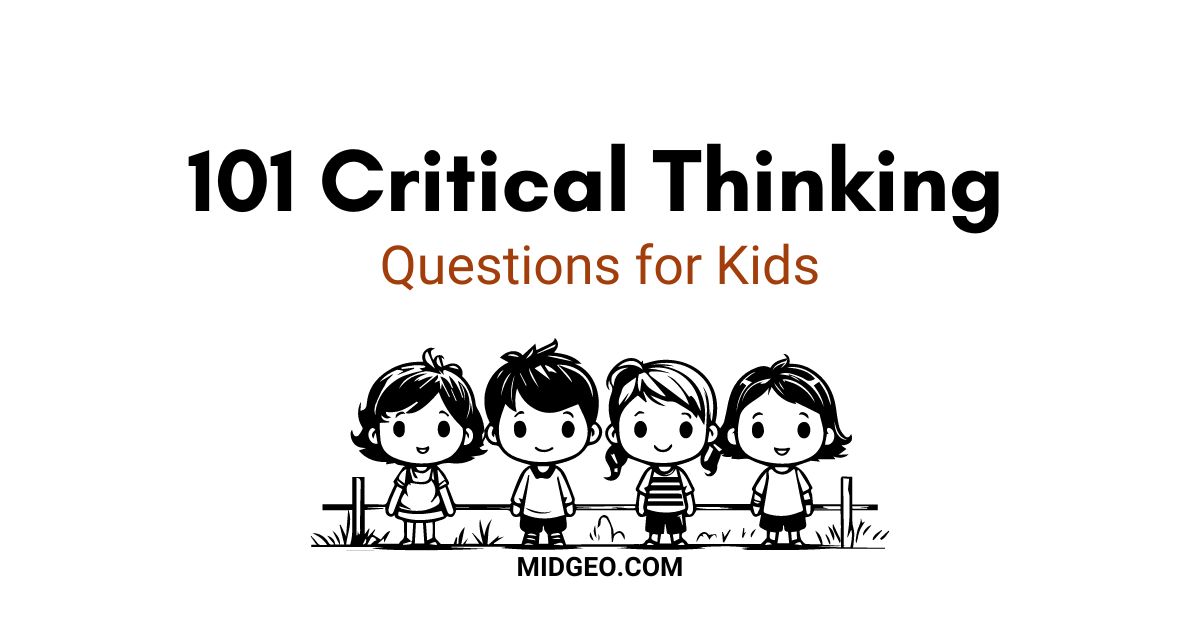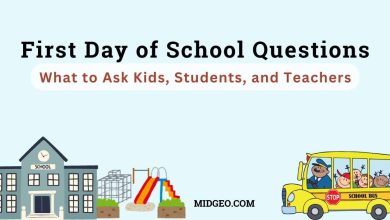101 Critical Thinking Questions for Kids: A Guide to Nurturing Young Minds

Critical thinking is an essential skill that helps kids analyze information, solve problems, and make informed decisions.
Encouraging children to think critically from a young age not only supports their academic growth but also prepares them for the challenges of everyday life.
- 100 Get To Know You Questions for Kids: Fun and Engaging Ways to Connect
In this post, we’ll explore 101 critical thinking questions for kids that are designed to stimulate their curiosity, creativity, and reasoning abilities.
Whether you’re a parent, teacher, or caregiver, these questions can be used to spark meaningful discussions and help children develop a deeper understanding of the world around them.
Why Critical Thinking Matters for Kids
Before diving into the questions, it’s important to understand why critical thinking is so valuable for children. Critical thinking:
- Promotes problem-solving: Kids learn to approach problems methodically, considering various solutions before making decisions.
- Enhances creativity: By thinking critically, children can explore different perspectives and come up with innovative ideas.
- Builds confidence: When kids develop their reasoning skills, they become more confident in their ability to tackle challenges.
- Improves academic performance: Critical thinking is linked to better comprehension, writing, and analytical skills, which are crucial for success in school.
- Prepares for real-life situations: Critical thinkers are better equipped to navigate complex situations, make informed choices, and understand the consequences of their actions.
- 101 Engaging Philosophical Questions for Kids: Sparking Curious Minds
Now, let’s get into the questions that can help nurture these skills in kids.
101 Critical Thinking Questions for Kids
Questions to Encourage Curiosity
- What do you think would happen if animals could talk?
- Why do you think the sky is blue?
- If you could invent something, what would it be and why?
- How do you think plants grow?
- What makes you wonder about the world?
- How do you think a computer works?
- Why do you think some animals hibernate in the winter?
- What do you think life would be like on another planet?
- How do you think ancient people built pyramids?
- What would you like to learn more about?
Questions to Explore Cause and Effect
- What would happen if there were no trees?
- How do you think people would behave if there were no rules?
- What would change if humans could fly?
- How do you think your day would be different if you had to walk everywhere?
- What do you think would happen if everyone spoke the same language?
- How would life change if there was no electricity?
- What do you think would happen if everyone was always happy?
- How do you think life would be different without technology?
- What would happen if we didn’t have seasons?
- How would the world change if everyone was kind all the time?
Questions to Promote Problem-Solving
- If you could change one rule at school, what would it be and why?
- How would you solve a disagreement between two friends?
- What would you do if you found a lost puppy?
- How would you organize a team to clean up a park?
- What would you do if you lost your homework?
- How would you make a toy from recycled materials?
- What’s the best way to save money for something you want?
- How would you prepare for a big test?
- What would you do if you had to plan a surprise party?
- How would you help someone who is feeling sad?
Questions to Inspire Creativity
- If you could create a new holiday, what would it be?
- How would you design your dream house?
- What kind of adventure would you go on if you could travel anywhere?
- How would you make a robot that helps people?
- If you could write a book, what would it be about?
- What kind of music would you compose if you were a musician?
- How would you redesign your favorite toy to make it even better?
- If you could create a new sport, what would the rules be?
- How would you make a movie about your life?
- What kind of art would you create if you had all the supplies you needed?
Questions to Encourage Empathy and Understanding
- How would you feel if you were in someone else’s shoes?
- What do you think it’s like to be a teacher?
- How do you think animals feel when they are in danger?
- What would you do if you saw someone being bullied?
- How would you help someone who is new to your school?
- What do you think it’s like to live in a different country?
- How would you make someone feel included in a game?
- What do you think is the best way to show kindness?
- How would you explain your favorite hobby to someone who has never tried it?
- What would you do if you saw someone who needed help?
- 222 Exploring the Power of Hypothetical Questions: A Guide for Meaningful Conversations
Critical Thinking Questions for Kids List
Questions to Develop Analytical Skills
- Why do you think some people like different foods?
- How would you compare a cat to a dog?
- What makes a story interesting to read?
- How do you think weather affects people’s moods?
- Why do you think some people prefer sunny days over rainy ones?
- How do you decide what clothes to wear each day?
- What makes a good friend?
- How do you choose what to read next?
- Why do you think people have different favorite colors?
- How do you decide which activities to do on the weekend?
Questions to Understand Perspective
- What do you think life is like for a firefighter?
- How do you think it feels to be a bird flying in the sky?
- What do you think it’s like to be an astronaut in space?
- How would you feel if you had to move to a new country?
- What do you think it’s like to be a doctor helping sick people?
- How do you think animals feel when they are at the zoo?
- What do you think it’s like to be a famous athlete?
- How would you describe your family to someone who has never met them?
- What do you think it’s like to be a teacher grading homework?
- How would you feel if you were a character in your favorite book?
Questions to Foster Decision-Making
- What would you do if you had to choose between two fun activities?
- How do you decide what to eat for lunch?
- What would you do if you had to pick a new hobby?
- How would you choose a gift for a friend?
- What do you think is the most important quality in a leader?
- How do you decide which book to read next?
- What would you do if you had to pick a movie for family movie night?
- How would you choose the best way to spend a free afternoon?
- What do you think is more important: being kind or being honest?
- How would you decide which sport to try?
Questions to Encourage Reflection
- What’s the best thing that happened to you today?
- How do you feel when you try something new?
- What’s one thing you’re really good at?
- What’s one thing you would like to improve about yourself?
- How do you feel when you help others?
- What’s the most important lesson you’ve learned so far?
- How do you handle it when things don’t go your way?
- What makes you feel proud of yourself?
- How do you decide what’s right and wrong?
- What do you think makes you unique?
Questions to Stimulate Curiosity About the World
- How do you think different cultures celebrate holidays?
- What do you think the world will be like in 50 years?
- How do you think technology has changed the way people communicate?
- What do you think is the most important invention in history?
- How do you think the environment affects where people live?
- What do you think it would be like to live in a different time period?
- How do you think different animals communicate with each other?
- What do you think is the most interesting thing about space?
- How do you think art and music influence people’s emotions?
- What do you think makes a city a good place to live?
- How do you think people can make the world a better place?
Conclusion,
Asking critical thinking questions is a powerful way to help kids develop important cognitive skills while also encouraging curiosity and creativity.
By engaging in thoughtful discussions, children can learn to analyze situations, consider different perspectives, and make informed decisions.
Whether at home, in the classroom, or during playtime, these 101 critical thinking questions for kids can be a valuable tool in nurturing their minds and preparing them for the future.
So, start asking, and watch as their minds grow and thrive!




